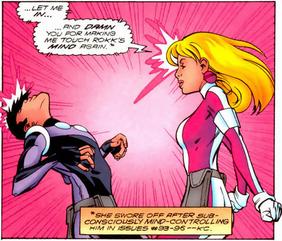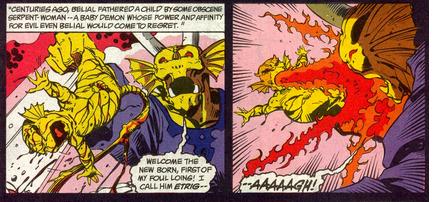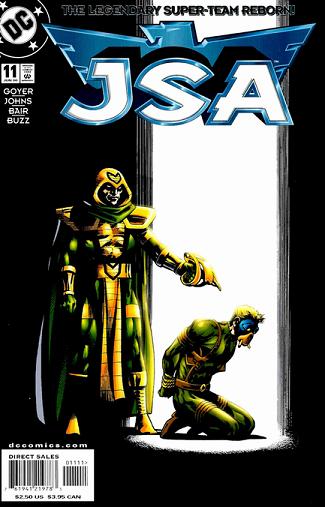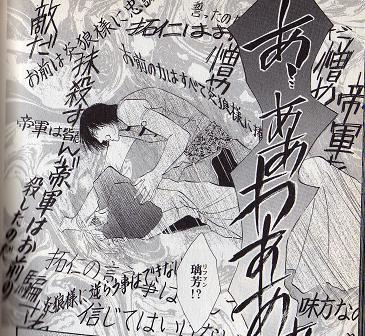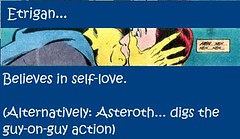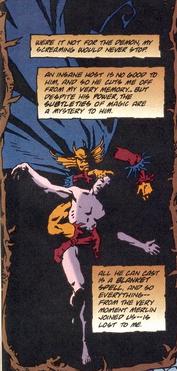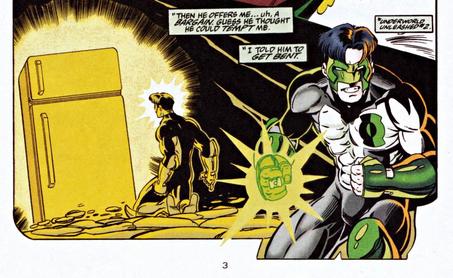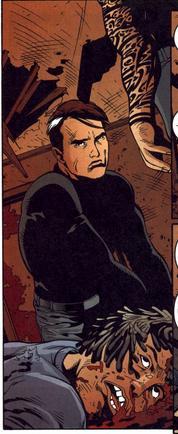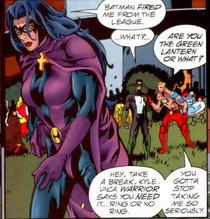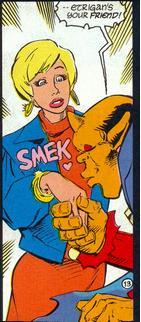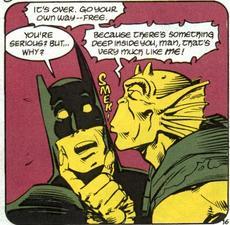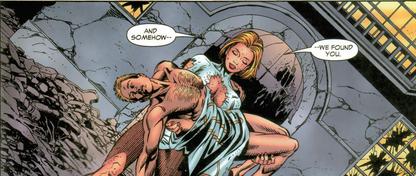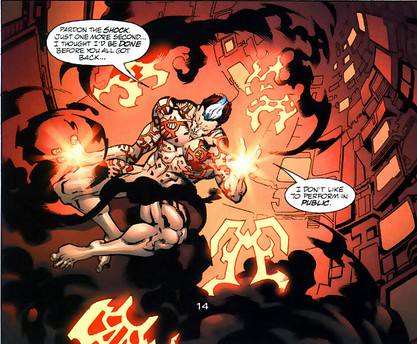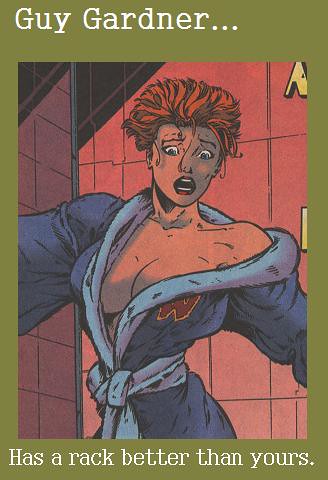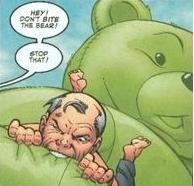A few minor spoilers for both Fables (though nothing terribly recent) and Robin below:
This month marks the end of Mr. Willingham's run on Robin, so I thought it suitable to write this now. I am a Robin fan, have been since A Lonely Place of Dying. I've tracked down and read every Robin issue I could find, Young Justice, Teen Titans, and any and all crossovers. I've read a fair chunk of all the Batman storylines that heavily featured Tim Drake as well.
I'm only saying this because I'm going to say something almost no other Tim fan will agree with: I didn't think Bill Willingham was that bad. Mind you, I don't think he was *good* on Robin. But I don't necessarily think it was because he didn't get the character. It was a question of style. Let me elaborate:
To me, Fables is the pinnacle of Mr. Willingham's work. Everything works in that series. Every single character, with the sole exception of Jack (who got written out anyway), is incredible. Even the ones like Prince Charming, Beauty and the Beast, Little Boy Blue or King Cole, who seem largely functionless at first, gradually grow and develop into fascinatingly three-dimensional characters with surprising depths and awesomeness.
So why isn't he able to make Robin that awesome. I don't actually think it's a lack of understanding of the character actually, and I'll elaborate on that in a bit. I think it's because he was trying to use what worked in Fables in Robin. And it didn't work.
See, Fables is all about taking a pre-conceived, shallow, one-dimensional idea and deconstructing it. Fairytales and Folklore are not designed for the characters themselves so much as to impart warning or morals. Whether it's don't talk to strangers or the Wolf will eat you or don't try to shoot for above your station (how many of Grimms' Tales involve evil servant girls taking the place of the poor princesses?). The Wolf in the stories has no real characterization, but we all have this idea of him from childhood retellings of the 3 pigs or Red Riding Hood.
So from the very beginning, by making Bigby Wolf one of the head protagonists, a grizzled cop type with heavy if gruffly expressed communal and emotional ties to the community, Willingham was turning everything on its ear.
And Fables is all about people being more than they appear. Even the initially strong characters like Snow White or Bigby get moments where you realize exactly how formidable they are behind their ball-breaking bureaucrat or rough-hewn cop facades. When Snow marches straight into the rebelling farm, unexpected cavalry at her back after being chased and on the run for her life. When Bigby Wolf transforms and takes a huff and a puff to blow Goldilocks away or tells Snow White how she's the one person he can't ignore...
Then there are characters like Boy Blue and his jaunt in the Adversary's world. Prince Charming and his killing of Blue Beard for his ex-wife. King Cole and his unexpected diplomatic prowess. Each revelation is both shocking but not unfitting at the same time. It's depth, not a 180 for a character.
And the story style of Fables allowed Willingham to do this. Fables doesn't have one main character really. It has many. There's very little introspective monologue. Most of the story is expressed solely through the characters' actions and dialogue. That means there's a lot we don't see right away and a lot of room for surprise and depth.
And that's why Willingham couldn't write Robin well. Superhero solo comics are all about the introspection. They're from one character's point of view and basically takes the reader through the character's mind to get there. *Especially* for Gotham characters. Gotham characters are all about the inner monologue. The hidden feelings, the angst, the thinking through puzzles. One of the parts that always made Tim so fascinating to me was how his inner monologues never hid the fact that he was afraid, that he knew when he was outmatched, but was still always thinking of a way to even the odds and get out with his head in tact.
Now, I was saying that I think Mr. Willingham does understand the character. I maintain that. There are parts of his writing of Tim that deep down ring true. For example, he gets a lot of flack for the way Tim ended up giving up being Robin. But if you think about it, it was the only way Tim *would* have left. The "Birthday Present" didn't drive him away because in the end, Tim didn't want to give up the relationships he made. No amount of personal transgression would make Tim leave the suit as long as he still had a role to fill and people that needed him and that he needed.
The only real way for Tim Drake to leave the suit behind was if another duty superceded it. And so Mr. Willingham used what had been in Tim's character since Dixon...the conflicting loyalty to his father. (And for the record, Willingham did NOT kill Jack Drake. Brad Meltzer did. :-P If you're going to bitch about probable editorial mandate, get it right. Now he did make Leslie evil/crazy, so bitch away about that. :-P). Now the journal and badly hidden uniform was dumb. Seriously. But I can see why it was used...and in a way it even made sense. Tim didn't *want* to hide from his father and keeping the secret was a very very heavy burden. Just like with Young Justice, Tim wants to tell, but he knows Bruce's identity depends on him keeping quiet. (I *love* that Jack figured out Bruce too, though, proved Tim right all those years).
Now what would have made it work, I think, would have been a reaction caption saying something like: "I know it was stupid to keep those there. Where anyone could stumble over them. But I think...deep down, I *wanted* Dad to find them. For him to find out, without me breaking my promise."
That would, I think, have been enough to explain why an otherwise incredibly meticulous young man would be so careless. And I think that's what Mr. Willingham had in mind really, but he's not used to the need to explain it. In Fables, it wouldn't have been explained. But in this, we needed to hear why. We know Tim better than we know any of the Fables characters. Through the captions, we've been in his head, and thus we need more of an explanation for seemingly poor characterization.
The other big instance where I think Mr. Willingham's lack of introspection-technique failed him was during the whole Uncle Eddie debacle.
See, a lot of Robin fans dropped the book cold when Bruce offers to adopt Tim and the latter agrees enthusiastically. I almost did myself. What the hell was that?! Even *before* the "Birthday Present" thing, Tim didn't really trust Bruce. Not completely. He's got a completely different relationship with Bruce than either Dick or Jason did.
I mean, think about it. He became Robin because Batman was *losing* it. That's not a way to foster a good father-son relationship, nor a lot of personal trust.
And the fact that Mr. Willingham had Tim so enthusiastic about it was horrifying.
But he was building up to something, the Uncle Eddie reveal. See, if you know Fables, you might remember the Cinderella storyline, in which we are meant to believe she is a spy for the Adversary and winning someone else to her side. She's on the phone with the Adversary and reporting on her progress. But then, it's a big reveal when we find out who she's actually talking to, and why. It's mindblowingly awesome.
I think that's what the Uncle Eddie reveal was going for. That same brand of "Holy crap! He *hired* him?!"
I mean, the scheme was good. Definitely worthy of Tim. Planted evidence, hiring an actor (how'd he get the money, another question, but I'll suspend disbelief)...and all because he can't bring himself to *tell* Bruce that he doesn't want to be adopted by him.
Overly convoluted clever plot when simple honesty would have done...yep. That sounds like Tim. So where's the problem?
The problem has to do with the fact that such jolting surprise doesn't work in Robin. We're supposed to be able to peek into the hero's head, to see how he gets from A to B. His monologue when he spoke to Bruce didn't indicate he was planning something. Or even a "Not on your life." The monologue didn't indicate anything but surprise when record of an Uncle Eddie showed up. And you can't *do* that. Either Tim's got a split personality he's not aware of, or the monologues should reflect his actual thoughts/emotions. What worked in Fables doesn't work here.
I've heard fans complain that Mr. Willingham's writing Robin too much like a normal kid, rather than the tiny little freak we all know Tim Drake is. I guess I agree and disagree with that. Mr. Willingham knows Tim's freaky, and does indeed utilize that occasionally, but he utilizes it as he would in Fables...under a normal teenage facade. Whereas Tim doesn't really have a normal facade. Everyone who meets him knows he's a little off.
See, Tim's not like Batman. He's not a scary, intense, emotionally wounded guy pretending to be a normal, flighty, male socialite. He's also not really like Dick, a relatively normal (if highly skilled and charismatic) kid putting on a mask to go fight crime. He's a kid who's so into the role he's supposed to play that he's systematically carving off anything that doesn't fit. Like D&D, like computer games, like school, like friends, like family... I mean, even in the really early parts of Dixon's run, Tim tended to identify himself by his roles: "Ariana's boyfriend", "his father's son", "Robin". Steph was the only character he didn't really have a set category for, and he met her and primarily interacted with her as Robin.
Tim's been, for three years of his time, and 16 years of ours, systematically turning himself into that mask while simultaneously struggling against the inevitability of taking Bruce's place. And that's a whole other kettle of fish than what Mr. Willingham is adept at portraying.
Added to that, Fables is a story that works on slow pacing and building tension. Robin is an action series. The pacing of a Fables story doesn't work for a Gotham story.
Though, you know...if you somehow put Willingham and Devin Grayson in a blender, you might end up with a perfect Bat-family solo title writer. He's slow paced, tension building, her action/drama keeps piling on without any sort of downtime to breathe. (Bam! Nightwing loses job. Bam! Nightwing loses apartment building. Bam! Blockbuster. Bam! Tarantula. Bam! Deathstroke and mob!). He's not good at the introspection, she's overboard with it. Put them together and you get an even paced story with appropriate action levels interspersed with slower building long term drama, with characters who are just introspective enough but not overly so.
--
That said, I'm really looking forward to Shadowpact. See, Willingham might be a poor suit for Gotham, but this is a different kettle of fish. 1st--more characters, less need for introspection. 2nd--it's about magic. And while my knowledge of magic comes solely from a few basic ceremonial magic books from five years back, it seems to me that magic is all about symbolism and using symbols (like an athame for air) to influence the real world. Now comic magic is more overt, but I think that element is still there. That should suit his overt appearances not always being all that there is style very well.
